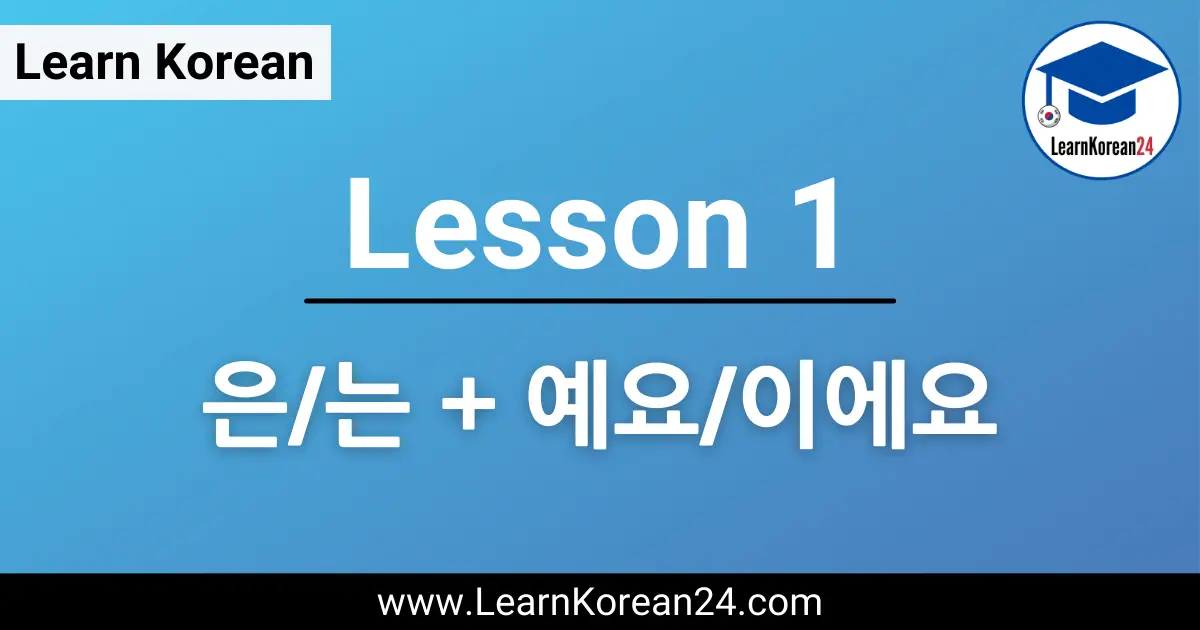Lesson 1: 은/는 + 예요/이에요
Welcome to LearnKorean24’s free Korean language course. In this first lesson, you will learn how to use the pattern 은/는 + 예요/이에요 to say things like “It’s a book”, “I am American.”, “I am a teacher.”, etc. Let’s get started.
Lesson 1:
은/는 + 예요/이에요
KEY INFORMATION
예요/이에요 [ye-yo/i-e-yo] = Ending which means ‘equal to’
은/는 [eun/neun] = Topic Marking Particle
예요/이에요 [ye-yo/i-e-yo]
First, let’s take a look at the ending 예요/이에요 [ye-yo/i-e-yo]. 예요/이에요 is used at the end of a sentence and is similar to the English word ‘is’ in the sense of ‘equal to’. To help you understand what we mean, let’s look at an example.
책 [chaek] = book
책 [chaek] + ~이에요 [i-e-yo] = 책이에요 [chae-gi-e-yo]
책이에요. [chae-gi-e-yo] = It is a book.
In this example, by adding the ending 이에요 to the word 책 (book) we create the sentence 책이에요 (It’s a book).
예요/이에요 Conjugation Rule:
When making your own sentences using 예요/이에요 you must choose either 예요 [ye-yo] or 이에요 [i-e-yo] to attach to the noun. The one you use depends on whether the final letter in the preceding noun is a vowel or a consonant.
| Conjugation Rule | Example |
|---|---|
| Noun Ending In Consonant + 이에요 | 가방이에요. (It’s a bag.) |
| Noun Ending In Vowel + 예요 | 바나나예요. (It’s a banana.) |
은/는 [eun/neun]
Next, let’s look at how to say things like “This is a book.“, “I am American.“, “I am a teacher.“. To make sentences like this you can use 은/는 [eun/neun] together with 예요/이에요.
은/는 [eun/neun] is what is known as a ‘topic marking particle’ and is used to mark a noun or pronoun as the topic of the sentence. For example, in the sentence “This is a book.“, the pronoun ‘This‘ is the topic of the sentence (i.e. the thing you are talking about) and so the Korean word for ‘this’ (이것) should be marked with the topic marking particle 은. See below.
이것 [i-geot] = this
이것은 [i-geo-seun] = this (with topic marking particle attached)
이것은 책이에요 [i-geo-seun chae-gi-e-yo]. = This is a book.
Let’s look at another example. In the sentence “I am American.” The pronoun ‘I’ is the topic of the sentence. And so when making this sentence in Korean, the Korean word for ‘I’ (저) should be marked with the topic marking particle 는. See below.
저 [jeo] = I
저는 [jeo-neun] = I (with topic marking particle attached)
미국 사람 [mi-guk sa-ram] = American Person
저는 미국 사람이에요. [jeo-neun mi-guk sa-ra-mi-e-yo] = I am American.
*The concept of Korean particles can be a little confusing for beginner learners, as English does not have these ‘particles’. These ‘particles’ follow a noun or pronoun to indicate a particular function or relation of that word. Confused? Don’t worry! You don’t have to fully understand the concept of Korean particles now. For now, just remember that attaching 은/는 [eun/neun] to a noun or pronoun ‘marks’ that word as the topic of the sentence.
은/는 Conjugation Rule:
Just like the ending 예요/이에요, there is a certain conjugation rule you must follow when choosing 은 [eun] or 는 [neun] to attach to the noun/pronoun. Again, the one you choose depends on whether the final letter in the preceding noun is a consonant or a vowel.
| Conjugation Rule | Examples |
|---|---|
| Noun Ending In Consonant + 은 | 이것은 (This) |
| Noun Ending In Vowel + 는 | 저는 (I) |
Example Sentences
Now let’s look at some example sentences using the structure 은/는 + 예요/이에요. If you would like to try and make your own sentences using this structure, you can simply substitute the nouns in the sentences below. Check out our lists of fruits, jobs, and countries to find some nouns you can use to make your own sentences using this structure.
바나나예요. [ba-na-na-ye-yo] = It’s a banana.
가방이에요. [ga-bang-i-e-yo] = It’s a bag.
이것은 사과예요. [i-geo-seun sa-gwa-ye-yo] = This is an apple.
이것은 책이에요. [i-geo-seun chae-gi-e-yo] = This is a book.
저는 제니예요. [jeo-neun je-ni-ye-yo] = I am Jenny.
저는 케빈이에요. [jeo-neun ke-bi-ni-e-yo] = I am Kevin.
저는 미국 사람이에요. [jeo-neun mi-guk sa-ra-mi-e-yo] = I am American.
마이클은 영국 사람이에요. [ma-i-keu-reun yeong-guk sa-ra-mi-e-yo] = Michael is British.
저는 선생님이에요. [jeo-neun seon-saeng-ni-mi-e-yo] = I am a teacher.
마르틴은 요리사예요. [ma-reu-ti-neun yo-ri-sa-ye-yo] = Martin is a chef.


